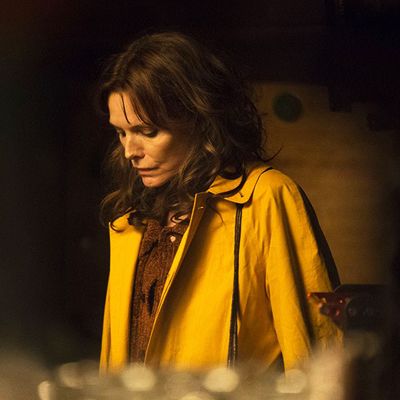
In Where Is Kyra?, Michelle Pfeiffer is stunning as a desperate, near-destitute woman whose life is shrouded in darkness. And not just metaphorical darkness. The Nigerian-born director Andrew Dosunmu seems to have a philosophical aversion to light. Either that or — as Pauline Kael once speculated about Clint Eastwood — he forgot to pay his Con Ed bill. See this on the big screen if you want to see it all. And do see it.
Somewhere in the pools of black is Pfeiffer as Kyra Johnson, who has moved into her elderly mother’s dim Brooklyn apartment, where she bathes and ministers to the frail old woman (Suzanne Shepherd), and walks her through the sunless city to the bank to deposit pension and disability checks. It’s clear this is a deeply loving relationship, despite the fact that they speak in monosyllables and the apartment appears to have only one light bulb. One day, after Kyra visits a succession of (also dim) offices looking for work that never comes, she returns to find her mother has died, leaving her with no support, emotional or financial. The emotional part is eventually taken care of by Kiefer Sutherland as a soft-spoken old-age-home worker whom she meets in a dark bar. Her solution to the financial problem, meanwhile, is novel, stirring, and — in keeping with movie’s visual palette — none too bright.
Nearly everything in Where Is Kyra? is indirect, off the nose. Early on, there are so few close-ups that it’s a while before we can even make out Pfeiffer’s features. But when those close-ups finally come, they register. Dosunmu and his accomplished cinematographer Bradford Young (Arrival) aren’t averse to color. They find pockets of it. When characters connect, the reds and greens glow. But their Brooklyn is otherwise a gray, dying city in which individual lives are lost amid a sea of tilted poles and street signs and overhead train tracks. The South African composer Philip Miller creates a soundscape of squeals and dissonant plinks, of horns that sound like groans of metal — or are they groans of metal transmuted into horns? There’s a bizarre industrial wail as the camera follows a bent-over old woman tapping her cane along the sidewalk towards a bank. Is that … ? Would she … ? Oh, yes, she would.
Pfeiffer’s performances tend to be high-strung, her dry, unmusical voice in striking contrast to her ethereal features. I didn’t think she could embody someone like Kyra, an outcast flailing to hold onto the social safety net and slowly, agonizingly, slipping through. But she has always been full of surprises. Here, the tension in her face and body is infectious — it puts us on edge. The boundlessly empathetic playwright Darci Picoult — who collaborated with Dosunmu on Mother of George — has pared the dialogue to its essentials. Kyra is too scared of losing what little she has to have the energy to muse on the politics of her situation. She needs to keep her phone turned on. She needs to pay the rent.
Once or twice, Where Is Kyra? crosses the border into the world of classic farce, of absurd disguises and babbled lies. But it’s slow-motion farce, with a clear view of the abyss. Although the movie causes eyestrain and has too many arty longueurs, Dosunmu pulls off something few directors dare: He makes the darkness visible.





